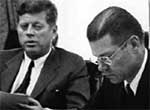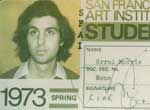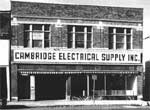October 27, 2004
Origionally appeared in Gothamist
With very little time left before the elections, it's pertinent that all of us do what we can to help distribute knowledge. Mr. Morris has been producing, with the assistance of MoveOn PAC, a number of video and paper advertisements to get the truth out. Spreading the word means distributing the advertisements, web and print based, as actively as possible in the coming days.
In an effort to do all he can to get the word out, Oscar Award winning Filmmaker Errol Morris talks to Gothamist's Ben Chappel about the election, his work with MoveOn PAC, his filmmaking style, and what we can do to help save the world.
BC: This election year, this political climate and national divide has become overwhelmingly stressful. I say this for myself, but I know it's true of a great number of other people.
EM: Myself included!
BC: I know. I've watched all of your Kerry ads for MoveOn.
EM: Did you watch them on my site, or on the MoveOn site?
BC: I watched them on your site.
EM: Oh, good.
BC: Why do you ask?
EM: MoveOn posted very few of them. A lot more are available on my site, and some of them have been re-edited.
BC: By MoveOn, or by you?
EM: By me. To make them stronger. But some of the best ads never really saw the light of day. But now they are posted on my site. I decided to post, not everything, because there are so many of them, but enough to give you an idea of the scope of the campaign. More characters, more spots.
BC: And the Switch ads, for Apple, are very similar in style.
EM: Well, the Switch ads came out of a film (made for the opening of the Academy Awards in 2002), where I interviewed over a hundred people on a white background. (I plan to post it on my web site, because it's one of the best things I've done.) Of course, I'm not the first person to film someone on a white background. It's been done by a whole number of photographers, August Sander, Avedon, etc. I have no patent, no trademark, on shooting someone on a white background. And when we first discussed shooting these ads, my producers and I would have endless discussions about the way to shoot these political ads, what the appropriate way of doing it might be. Should the lighting be absolutely flat? Should the background be white? Of course, when you try to do something that's free of artifice, somehow that becomes artificial as well. But I like the idea that there's something very straightforward about the ads.
BC: You don't get the flashiness of FOX news, and all that. It's just a human being, standing there. Is the purpose, in your mind, to make it more human, more appealing and more real?
EM: It is the interviewing style rather the choice of background. My interest is primarily in what people are saying, and in not detracting or distracting from what they're saying, because that's at the center of what I'm doing. Not just with these ads but in my movies as well. It's this idea that people reveal themselves through how they speak, and if you let them speak without interrupting them, then you're going to learn something. You're going to hear something surprising. You're going to hear something different. I used to joke that my goal was to do interviews where I just did not talk at all, where I asked no questions. I just sat there and listened. But in practice it doesn't quite work out that way. I am there, asking questions. But, still, the goal is to have these extended monologues, rather than a Q&A where I come into an interview with a list of questions that I tick off, one by one.
BC: Well, that's the thing! In the process of preparing questions, so many more come up that it becomes, seemingly, an impossibility to really tie it down, and you never know where the conversation is gonna go.
EM: That's correct!
BC: And you never know where you're gonna need to, or want to, ask a further question. You know, where you're talking about your style of interview, and going into it allowing people to be more human or express themselves in a way that would be unexpected, I know that you've also set it up in a unique way, right, with your image being projected in front of the camera, so they're looking at you, while into the camera?
EM: Yes, the Interrotron, my invention. I used it for the first time when I was shooting "Fast, Cheap and Out of Control." I've read in a number of places that I intended to put Fred Leuchter, who became the subject of a later film, into "Fast, Cheap". To the best of my recollection, that's simply not true. I did interview Fred before I interviewed those four characters, and the argument was, "Let's try this device out. Maybe my subjects are going to run out of the room, screaming. Let's try it on Fred. (Laughs)"
BC: Who drinks, what was it, like forty cups of coffee a day.
EM: Exactly. Let's try it on Fred, and see if it works. And it worked like a charm. And so, then, we used it for the other four characters, for Rodney Brooks, George Mendonca, Dave Hoover and Ray Mendez. And I've used it ever since. Because of eye contact. A whole combination of things. It's an odd device. And the more I use it, the odder it seems to me.
BC: What does it look like to the interviewee?
EM: Basically, it's two teleprompters and two cameras. I didn't do much. It's just that other people never thought of doing it all. People never though of using teleprompters in that way. Prompters were designed so that newscasters and politicians could read text and maintain eye contact with their audience. You're Dan Rather, and you're looking directly into the camera, and at the same time you're reading prepared copy. The text is not appearing above the lens or to the side of the lens, it's right over the lens on a half-silvered mirror.
BC: So you just put yourself on there?
EM: Well, I put myself on there, but there's a little bit more. Think about it, if I put a camera on myself, and I'm not looking directly into the lens, it's not going to work. So what's really needed is two teleprompters. And you cross-connect them, so the video feed on the B-camera goes to the A-prompter, and vice-versa. So they're both connected, and we're both looking at each other's video images on a half-silvered mirror, in front of the lens. (My production designer, Ted Bafaloukos, said: "the beauty of it is that it allows people to do what they do best, namely watch television.) But it's how I use it. I have this need to create a stream of consciousness narration, rather than an exchange between two people. It could be used to record a conversation, as well. It's an aesthetic decision. I have heard people complain about "The Fog of War," "You weren't hard enough on McNamara." And when I hear this complaint, which, by the way, I do not agree with, I hear them saying, "You didn't create an adversarial interview, which is what we expected. You created something different. You allowed him to rattle on, without constantly challenging him." Yes and no. But there is something about his first person narration that deeply fascinates me. I sometimes call the "The Fog of War," history inside-out because I am interested the question of what's inside McNamara's head. I'm endlessly interested both in events and how they are perceived by people. For example, McNamara said he's a war criminal...
BC: Well he said, right, that if we hadn't won, they would have all been charged as war criminals, and he agreed that they were acting as such.
EM: Right. And then he adds, "What makes it so different if you lose of if you win?" And, I suppose, you could say that's an evasion, but to me, it's a real question.
BC: I think it's a very pertinent question.
EM: Yes. I've been asked, "Did you ask McNamara about war crimes with respect to Vietnam?" And the answer is, I did after the film was finished. I went with McNamara to the International Criminal Court in The Hague. This was after the movie was finished. And I asked him, "Were you a war criminal with respect to your policies in Vietnam?" Suffice it to say, his answers have been tortured and equivocal.
BC: During Vietnam, did he fascinate you, or did you consider him to be this awful, pompous, dangerous guy? What was your opinion of McNamara in those days, when he was so harshly regarded by so many people?
EM: I hated him.
BC: Yeah, that's what I figured. And now what do you think about him?
EM: Well, I don't hate him. I'm puzzled by him. McNamara quotes T.S. Eliot. It's near the end of the film. And it's an optimistic quotation. It tells us that we learn something through experience. That we return to where we started and we know the place for the first time. That somehow, life leaves us with something. Call it additional insight, knowledge, whatever.
BC: And that leads me to a very important question, in terms of what's going on today in Iraq and the similarities with Vietnam, where supposedly you learn from history, and you learn from the mistakes made before, but it seems like nobody in any kind of power has learned anything. I heard your speech backstage after you won the Oscar, talking about how you starting filming "The Fog of War" before 9/11, and history just kind of caught up with what was happening.
EM: Absolutely true.
BC: And McNamara does have that quote, the T.S. Eliot bit at the end, and it leaves me in a curious position, because it doesn't feel as though anyone in the current administration remembers anything from what we went through in Vietnam, and the similarities of two Secretaries of Defense in two quagmires of war environments against ideologues.
EM: Well I posted a revision of Santayana's famous quote on my web site, the Santayana quote: "Those who are unfamiliar with the past are condemned to repeat it." My emendation: "those who are unfamiliar with the past are condemned to repeat it without a sense of ironic futility." Take the lessons in "The Fog of War". The lessons are ironic. "Maximize Efficiency." Well, that's very well and good, but what if you're maximizing efficiency to the end of slaughtering people? And the last lesson — "You Can't Change Human Nature" - tells you that, if true, then the other lessons don't matter much! If you can't change human nature, then we are condemned to war, condemned to a repetition of the follies of the past. It tells us that the situation is hopeless. One of the reasons that I like "The Fog of War"� Somebody asked me if this was my favorite film, and I said, "Yes." And the answer is yes because it's my most despairing film. And my most complicated film. At least for me.
BC: Well, coming from a history of hating McNamara to sitting in front of the man, and having him talk all about this time that you remember with a lot of emotion attached to it...
EM: That I remember with horror� And then at the very end, when he says, "I prefer to be damned if I don't," I have the feeling that maybe we just don't learn anything. That we're just trapped. And trapped by what, I can't say. Trapped by ourselves, trapped by history.
BC: But that leads to your support for Kerry, and I'll preface that: How did you get involved with the MoveOn ads for Kerry?
EM: This has been my "mission to nowhere" for a while. Shortly after the Oscars, I decided I wanted to do something on behalf of Kerry....
BC: Was it, for you, an "anyone but Bush" thing, or was it always a Kerry thing, you living in Massachusetts and all.
EM: Well, I'm a Democrat.
BC: But was it specific to Kerry, or was it just anyone but Bush, for your preference?
EM: It was anyone but Bush. But I started reading about Kerry, because I thought, "Look, if I'm going to be doing this, I should know something about him." It's very interesting, because there's a very strong case to be made for Kerry, in my view. I'm not sure that he himself has made it, but it's there. I was really impressed to read about his role in exposing Iran/Contra. And his testimony before the Senate Foreign Relations Committee as a Vietnam veteran. I was puzzled by this idea, developed at the convention, that his great heroism was in fighting in Vietnam, the purple hearts, the silver star, blah, blah, blah, blah, blah. For me, the great act of heroism was not going to war, it was going to war and then standing up and saying that the war wasn't accomplishing the objects it set out to accomplish, and that people were dying for no reason and that the war should be stopped. That, to me, was the real example of Kerry's heroism and still is. I have no trouble voting for the man. None.
BC: Neither do I. And do you think that Kerry could help in our current situation? What do you think Kerry could do, if elected?
EM: That's such a difficult question, because as we all know, George Bush has put this country in an untenable position. Untenable in so many ways, untenable because now having done this, it's unclear how one undoes it.
BC: You don't have any idea whether or not Rumsfeld or Bush have seen "Fog of War," do you?
EM: I doubt that they have. I just can't picture Bush hunkered down over "The Fog of War". The film, for me, was part of an attempt to understand history. I'm not sure Bush is interested in that sort of thing. One reviewer said to me, "This is your least ironic film." And I said, "Oh?" (laughs). I think there are many, many ironies in this film. In fact, I think it's perhaps my most ironic film. You have a control freak. One of the most famous control freaks of the twentieth century telling you, without him really knowing it, that (in many of the historical events he describes) the world was out of control! False ideologies, confusions, misperceptions, error, wishful thinking, self-deception, luck. A grab bag of frightening stuff.
BC: And what about McNamara as Secretary of Defense in his time versus the perception of Rumsfeld in his?
EM: Well, you know, people constantly ask me about whether Rumsfeld reminds me of McNamara. Rumsfeld does seem to be a McNamara manqué. The "Rumsfeld Persona" seems lifted straight from McNamara. The glasses. The hair. The whole deal. But McNamara seems much closer to Colin Powell. There is considerable evidence that it was not McNamara who pushed LBJ towards war, that is was the other way around. And that poses a central question for our democracy: what do you do if you serve a bellicose president who wants to go to war? For many people this amounts to an unconscionable rewriting of history. It's politically incorrect -- certainly on the left, and that's where I am, more or less -- to say that McNamara is not a complete asshole! (laughs). On Counter-Punch (Alexander Cockburn's site): — I'm described in a headline, "Filmmaker Thanks War Criminal In Front Of Billions."
BC: I think it's very important to take into account, though, the distance that McNamara has had from the events and the perspective that he's potentially gained. He says in the film, and that's where the title comes from, the expression "The Fog of War," that it's impossible to have a clear vision of what's actually happening when you're so entrenched in it, with no idea of how we're ever going to get out.
EM: Well, I would call it "The Fog of Everything." Are we ever able to see ourselves clearly, or to understand what's going on around us? Not that this, by the way, relieves us of responsibility for our actions. I've heard people say "The Fog of War: A convenient excuse for not taking responsibility for decisions made during wartime." But, to me, you can be out of control and still be held responsible for your actions. I don't think you can argue, "The Fog of War made me do it."
BC: No, I really hope not.
EM: I'm trying to post more of these ads. I don't even know why, I can't even tell you why. I went to a whole lot of people before MoveOn. I went to the Media Fund, I went to the DNC, I went to the Kerry campaign. I offered them all kinds of advertising. And I became mired in endless bureaucracy. Indecision, equivocating. No one said: no, but no one said: yes. Month after month went by, and then I shot a number of ads myself. I was directing a series of Quaker Oats commercials in Los Angeles and I just brought in some people and interviewed them and cut some commercials to show people what these ads could like look. And finally, I interested Wes Boyd at MoveOn in paying for a couple of days of shooting. That was at the third week in July. I shot for four days and shot over 40 people. And gave each person I interviewed about an hour. There's a lot of material of people speaking about a lot of different issues. I would have done more, if I could, to tell you the truth.
BC: Then you cut those down to 30-second spots?
EM: I cut them down to 30-second spots, and some of them (despite their length) are very powerful. Curiously, they work in very different ways. Some are intellectual, some emotional, some funny.
BC: I absolutely agree with that. I think they're great.
EM: Well thank you. See, I like hearing this. I've gotten very discouraged by a lot of this.
BC: Seeing them, and with the election coming up so quickly, I thought it important to talk to you about the importance of the election.
EM: When you bring a group of people into a studio and you start talking to them, certain themes emerge. A woman who had a brother in Iraq. A man whose son was in Iraq. A Marine who had served in Iraq who is no longer in the Armed Forces. An ex-steel company executive who found himself working for a little bit more than minimum wage. Done correctly, it gives you a kind of portrait. It's not an unbiased portrait — obviously, these people are upset and angry — but it's an interesting portrait of a group of people at this particular juncture in history.
People wanted me to do re-enactments in ads. But my career doing commercials really took off about five or six years ago. And, oddly enough, I never interviewed people in ads. Never. Nobody asked me to do it. I just was not considered to be a person who did that sort of thing. They wanted me to do stuff with actors, with visuals, but it was never, "We need to get Errol Morris to do real people ads." Which, actually, pleased me. Because it meant that I was doing something different all the time, different than expected. And then along came 9/11, and I had been hired by a Mid-Western agency, Fallon, to do a series of ads for United Airlines. And we went out to O'Hare, we were actually going to be doing scripted ads, and we were scouting various locations of the airport, and Bush announced the invasion of Afghanistan. And so we almost immediately lost our permission to shoot at the airport. And the job was going to be canceled, which can be very lucrative, because they have to pay you anyway if they do it on such short notice. And I said, "You know, I'd rather do something than nothing. I'd like to go to a studio, and I'd like to take these people, and interview them." Employees of United Airlines. For a very simple reason: it's an historic moment. The airlines have been directly affected by this disaster, and United and American Airlines have been affected directly, it was their planes that went down. I'd like to talk to these people. So then we did this series of real people ads, and from that point on, I've been doing more and more of this sort of thing. And the producer of the Academy Awards that year called me and asked me to do this film. And then Steve Jobs was in the audience, and he saw it, and wanted me to do the Switch ads, exactly like I had done the film for the Academy Awards.
I wrote to Steve Jobs. Very early on I said to him, "How about a switcher campaign for the democrats?" And he wrote back, almost immediately, saying, "I think that's brilliant! I think you should do it!" His only reservation was, he said, "If they're gonna do it, they've gotta really do it. They can't just sort of do it, or want to do it, or kind of do it, or maybe do it. They gotta do it. They gotta embrace it. They gotta make it, you know, if not the central element of their advertising campaign, it has to be at least an important element, and it should be unveiled at the Democratic Convention." And Jobs, I believe, tried to interest various people in doing this, and his experience is not unique, it's similar to my own. It's the experience of really wanting to contribute, of wanting to do something, confronted with a bureaucracy that is not really making decisions. And a lot of the ads have been perfunctory. I don't know how better to describe them. And I don't see them as a campaign. I don't see them as anything more than reactive.
BC: Are the Kerry MoveOn ads aired on television? I live in New York, so obviously I don't get to see them.
EM: Very few of them aired. In fact, they ran in a very limited way, 5 of them, during the Republican Convention on FOX, and then they ran one in swing states. Of course the problem here is, this isn't one ad, it's a campaign. The minute you see them all on my web site, and you start looking at some of them, it becomes more and more obvious. Also, I posted the newspaper ads that were designed by Winterhouse + Pentagram. The newspaper ads were great! And they ran once in the New York Times, but my hope was that the ads would be running constantly. I even had this idea, "Adopt a City," like "Adopt a Highway." Adopt Cincinnati! Adopt Cincinnati and turn it blue! And then I blame myself for not trying hard enough or not doing enough or not doing the right thing, not thinking this through properly, I don't know.
BC: You blame yourself for the ads not getting out there more?
EM: Yeah. It's true! But I'm going to Wisconsin with my family, next Saturday, and we'll be there through Tuesday, and we're working for Kerry in Janesville, WI, getting out the vote. I'm delighted to talk about this stuff, because it's on my mind. I'm an obsessional character to begin with, but this election is really important. Someone asked me if I was in a state of depression or despair, and I said, "absolutely not, but it is a state of extreme enervation. Of just feeling depleted by it all. Of not knowing what to do, feeling I have to do something, frustration. At the moment, though, my agenda is a very simple one: get Kerry elected. There seems to be renewed interest in the ads, and I'd like to see them on the air, and to whatever extent I can get them out is better than just letting them sit.
BC: What do you say in these last days to a bunch of New Yorkers or other liberal city-dwellers who feel completely helpless because everyone they know is already voting for Kerry?
EM: That if they know people who can help get these ads out there, or they know a way to get them out there, that they should try to do so. People have now talked about running those in Ohio and Wisconsin and Florida. It's still not too late, although it's quickly becoming too late, to get these things out there. You know, you do what you can, when you can do it. That's all I can say. There's a week to go, and I do think the election could be decided by very few votes. So, have at it.
As Time Closes In: A Conversation With Errol Morris
Election Special: A Conversation With Errol Morris






